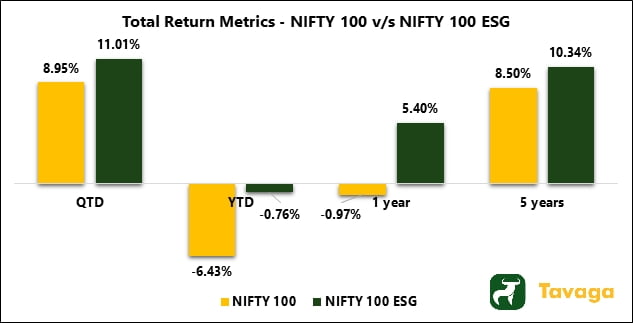In the recent past, there is a lot more awareness seen in terms of sustainability. The corporate has started charting the plan for climate sustainability. There is already a climate emergency declared worldwide. Under such a scenario, it is imperative for businesses to look for climate sustainability as one of the business drivers. ESG Mutual Fund is a new philosophy based on climate sustainability.
Select Your Favorite Section
In this article, we will understand what is ESG Mutual Fund schemes and whether you should invest in it or not?
What is ESG Mutual Fund?
Let’s breakdown the word ESG as below:
E = Environment: This is basically aiming towards conservation and preservation of natural resources. Our country is becoming more and more sensitive to climate change and pollution control. In India, now the companies who are following all the rules and regulations pertaining to climate change and pollution control will have a relaxation from certain regulations as compared to those who do not regard the impact of their business has on the environment.
Thus it is compulsory for businesses to adopt the green culture in their business practices so that the environmental impact can be minimized.
S = Social: Social responsibility was the word only limited to the big corporates up till now. But it has been widely accepted by more and more companies. Companies have now started taking care of their employees and their well-being. The Health and safety of the workers, gender neutralization, and well-being are now talked about within the companies. These also include CSR initiatives taken by the companies.
These companies build trust not only with their workers but with the customers as well. For example, take the name of any Tata company which is so committed towards its employee safety and well-being.
G = Governance: Good governance is the basic fundamental of any company. Without good governance, the company cannot sustain itself for the long term. Good governance means accepting what is RIGHT and declaring the accurate scenario in terms of the company financials. Hiding the reality from its stakeholder will not help the company sustain for the long period. Sooner or later the bubble will burst and people will lose trust in the company. Once the credibility is lost, it will never be the same again.
The companies who adopt fair business practices are more likely to be benefited by the consumers and government.
Based on the above three factors, the company is assigned an ESG score. The score ranging from industry leaders to industry laggards. below is the rating scale for ESG.

Should You Invest in ESG Mutual Funds?
Well, there are two schools of thought on ESG Mutual Funds in India. One says that you must invest in these funds as they are well-diversified funds. The future of the companies in which the fund is investing is secure and bla bla bla..
The other side there are saying that don’t invest in ESG funds as they are not worth while. There is only a hype created around the ESG thing. There is nothing special in these funds. They are just another thematic funds.
Now let’s check the portfolio of ESG mutual funds. For this we have Nifty 100 ESG index which was launched in 1st april 2011 with a base vale of 1000 points.

As you can see above that the ESG index has reached 3000 points in Feb 2021. That is a 2000 point jump since its inception. If we calculate the return of the ESG index it is coming out to be a 12% CAGR return over the last 10 years against the 10% return over the same period by the Nifty 50 index. So there is a clear cut gain of 2% as compared to nifty 50 performance for the same period.
Below is the ESG index weightage in the different industries. The dominant industries in which the ESG funds are investing are Banking & Finance followed by IT and FMCG industries. The investment is spread across multiple sectors and that is the reason the index is able to fetch 2% extra as compared to Nifty 50.

Now let’s compare the ESG index with the Nifty 100 index. Below is the performance trend of both indices. Here also you can clearly see that the ESG index has outperformed the Nifty 100 index by 2%.

Looking at the above performance comparison, One can invest in the ESG funds for a longer period. But remember, there is no guarantee on the return in the future.
Eligibility criteria for ESG fund
In ESG Index, the weightage is given to the individual company based on their ESG score and market capitalisation. to be a part of the investing company under ESG fund, below criteria must be met by the company.
- The individual stock must be a part of the Nifty 100 index
- The company must have an ESG score
- Negative business like tobacco, alcohol, gambling, etc are excluded from ESG funds
- A company with a higher controversy score of 4 or 5 will be excluded from the fund
Why You Should not invest in ESG Mutual Fund?
As we find that the ESG mutual fund index have outperformed Nifty 100 index by 2%. But still there are few concerns which make ESG less attractive. Let’s check them as well.
- To assess the ESG footprint of the company, its past data is taken into consideration. The accuracy and authenticity of such data are a big question.
- To judge a company on the ESG parameters, there has to be an extensive audit, and reporting is required, and that will only succeed if the company is being part of that audit.
- The method to determine the ESG score for a company is highly subjective.
- There are chances that the company may hide the actual picture and paint the goody picture just for the sake of getting an ESG score.
- Most of the ESG funds don’t have a track record as most of them are newly launched.
- ESG funds are thematic funds in nature, so they have no restriction over the asset allocation to a certain proportion.
Conclusion:
After checking both the side of the coin, it is investor’s decision whether to invest in ESG Mutual Fund or not. If you ask me, my personal opinion says not to invest in any Thematic fund. They are not secured and there is no control over its asset allocation. Rather, I would suggest you invest in a simple index fund that will give you 16% to 17% returns in the longer run.


